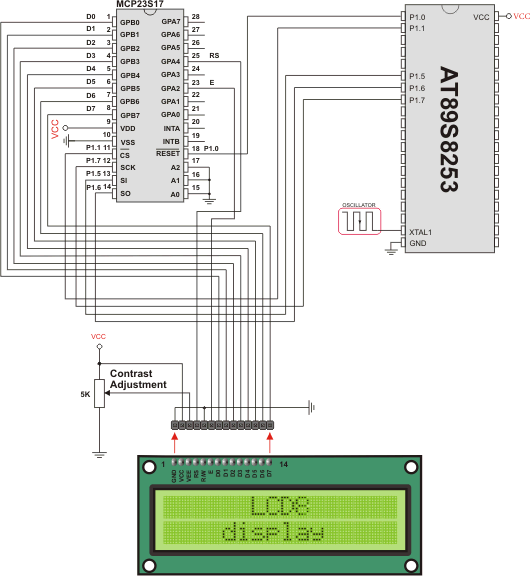SPI Lcd8 (8-bit interface) Library
The mikroC PRO for 8051 provides a library for communication with Lcd (with HD44780 compliant controllers) in 8-bit mode via SPI interface.
For creating a custom set of Lcd characters use Lcd Custom Character Tool.
Note:
- The library uses the SPI module for communication. The user must initialize the SPI module before using the SPI Lcd8 Library.
- This Library is designed to work with the mikroElektronika's Serial Lcd/Glcd Adapter Board pinout. See schematic at the bottom of this page for details.
External dependencies of SPI Lcd Library
The implementation of SPI Lcd Library routines is based on Port Expander Library routines.
External dependencies are the same as Port Expander Library external dependencies.
Library Routines
SPI_Lcd8_Config
| Prototype |
void SPI_Lcd8_Config(char DeviceAddress); |
|---|---|
| Returns |
Nothing. |
| Description |
Initializes the Lcd module via SPI interface. Parameters :
|
| Requires |
The SPI module needs to be initialized. See SPIx_Init and SPIx_Init_Advanced routines. |
| Example |
// port expander pinout definition sbit SPExpanderRST at P1_0_bit; sbit SPExpanderCS at P1_1_bit; ... SPI1_Init(); // initialize spi interface SPI1_Lcd8_Config(0); // intialize lcd in 8bit mode via spi |
SPI_Lcd8_Out
| Prototype |
void SPI_Lcd8_Out(unsigned short row, unsigned short column, char *text); |
|---|---|
| Returns |
Nothing. |
| Description |
Prints text on Lcd starting from specified position. Both string variables and literals can be passed as a text. Parameters :
|
| Requires |
Lcd needs to be initialized for SPI communication, see SPI_Lcd8_Config routines. |
| Example |
// Write text "Hello!" on Lcd starting from row 1, column 3: SPI_Lcd8_Out(1, 3, "Hello!"); |
SPI_Lcd8_Out_CP
| Prototype |
void SPI_Lcd8_Out_CP(char *text); |
|---|---|
| Returns |
Nothing. |
| Description |
Prints text on Lcd at current cursor position. Both string variables and literals can be passed as a text. Parameters :
|
| Requires |
Lcd needs to be initialized for SPI communication, see SPI_Lcd8_Config routines. |
| Example |
// Write text "Here!" at current cursor position:
SPI_Lcd8_Out_CP("Here!");
|
SPI_Lcd8_Chr
| Prototype |
void SPI_Lcd8_Chr(unsigned short row, unsigned short column, char out_char); |
|---|---|
| Returns |
Nothing. |
| Description |
Prints character on Lcd at specified position. Both variables and literals can be passed as character. Parameters :
|
| Requires |
Lcd needs to be initialized for SPI communication, see SPI_Lcd8_Config routines. |
| Example |
// Write character "i" at row 2, column 3: SPI_Lcd8_Chr(2, 3, 'i'); |
SPI_Lcd8_Chr_CP
| Prototype |
void SPI_Lcd8_Chr_CP(char out_char); |
|---|---|
| Returns |
Nothing. |
| Description |
Prints character on Lcd at current cursor position. Both variables and literals can be passed as character. Parameters :
|
| Requires |
Lcd needs to be initialized for SPI communication, see SPI_Lcd8_Config routines. |
| Example |
Print “e” at current cursor position:
// Write character "e" at current cursor position:
SPI_Lcd8_Chr_CP('e');
|
SPI_Lcd8_Cmd
| Prototype |
void SPI_Lcd8_Cmd(char out_char); |
|---|---|
| Returns |
Nothing. |
| Description |
Sends command to Lcd. Parameters :
Note: Predefined constants can be passed to the function, see Available SPI Lcd8 Commands. |
| Requires |
Lcd needs to be initialized for SPI communication, see SPI_Lcd8_Config routines. |
| Example |
// Clear Lcd display: SPI_Lcd8_Cmd(_LCD_CLEAR); |
Available SPI Lcd8 Commands
| SPI Lcd8 Command | Purpose |
|---|---|
| _LCD_FIRST_ROW | Move cursor to the 1st row |
| _LCD_SECOND_ROW | Move cursor to the 2nd row |
| _LCD_THIRD_ROW | Move cursor to the 3rd row |
| _LCD_FOURTH_ROW | Move cursor to the 4th row |
| _LCD_CLEAR | Clear display |
| _LCD_RETURN_HOME | Return cursor to home position, returns a shifted display to its original position. Display data RAM is unaffected. |
| _LCD_CURSOR_OFF | Turn off cursor |
| _LCD_UNDERLINE_ON | Underline cursor on |
| _LCD_BLINK_CURSOR_ON | Blink cursor on |
| _LCD_MOVE_CURSOR_LEFT | Move cursor left without changing display data RAM |
| _LCD_MOVE_CURSOR_RIGHT | Move cursor right without changing display data RAM |
| _LCD_TURN_ON | Turn Lcd display on |
| _LCD_TURN_OFF | Turn Lcd display off |
| _LCD_SHIFT_LEFT | Shift display left without changing display data RAM |
| _LCD_SHIFT_RIGHT | Shift display right without changing display data RAM |
Library Example
This example demonstrates how to communicate Lcd in 8-bit mode via the SPI module, using serial to parallel convertor MCP23S17.
char *text = "mikroElektronika";
// Port Expander module connections
sbit SPExpanderRST at P1_0_bit;
sbit SPExpanderCS at P1_1_bit;
// End Port Expander module connections
char i; // Loop variable
void Move_Delay() { // Function used for text moving
Delay_ms(500); // You can change the moving speed here
}
void main() {
// If Port Expander Library uses SPI1 module
SPI1_Init(); // Initialize SPI module used with PortExpander
// // If Port Expander Library uses SPI2 module
// SPI2_Init(); // Initialize SPI module used with PortExpander
SPI_Lcd8_Config(0); // Initialize Lcd over SPI interface
SPI_Lcd8_Cmd(_LCD_CLEAR); // Clear display
SPI_Lcd8_Cmd(_LCD_CURSOR_OFF); // Turn cursor off
SPI_Lcd8_Out(1,6, "mikroE"); // Print text to Lcd, 1st row, 6th column
SPI_Lcd8_Chr_CP('!'); // Append '!'
SPI_Lcd8_Out(2,1, text); // Print text to Lcd, 2nd row, 1st column
// SPI_Lcd8_Out(3,1,"mikroE"); // For Lcd with more than two rows
// SPI_Lcd8_Out(4,15,"mikroE"); // For Lcd with more than two rows
Delay_ms(2000);
// Moving text
for(i=0; i<4; i++) { // Move text to the right 4 times
Spi_Lcd8_Cmd(_LCD_SHIFT_RIGHT);
Move_Delay();
}
while(1) { // Endless loop
for(i=0; i<8; i++) { // Move text to the left 7 times
Spi_Lcd8_Cmd(_LCD_SHIFT_LEFT);
Move_Delay();
}
for(i=0; i<8; i++) { // Move text to the right 7 times
Spi_Lcd8_Cmd(_LCD_SHIFT_RIGHT);
Move_Delay();
}
}
}
HW Connection

SPI Lcd8 HW connection
What do you think about this topic ? Send us feedback!



